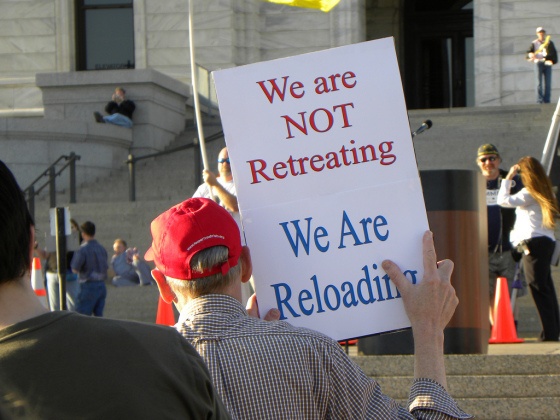South Carolina primary a test of Tea Party's strength

After Iowa's inconclusive GOP presidential primary, eyes are turning southward to the next primaries on the calendar, including the January 21 contest in South Carolina.
South Carolina primaries have a rough-and-tumble reputation. In 2000, Sen. John McCain famously suffered from a whispering campaign that claimed his wife was a drug addict and his adopted Bangladeshi daughter was a "black child" that resulted from an illicit affair.
But South Carolina won't just be a test of who's toughest; it will also be a broader referendum on the state of Tea Party politics in the South.
South Carolina was a big success story for the Tea Party: In 2010, the burgeoning movement helped sweep Gov. Nikki Haley into office, as well as four Congressional Republicans. But part of Haley's support came from moderate Republicans, including an endorsement from presidential hopeful Gov. Mitt Romney.
Now Haley is returning the favor and campaigning for Romney -- much to the chagrin of South Carolina's Tea Party faction. As Karen Martin of the Spartanburg Tea Party told NPR:
There's no Tea Partier that I talk to in the state or nationally that would want to promote Romney. Other than the people that have come out publicly and endorsed Mitt Romney and the people left over from his 2008 campaign, I do not personally know anyone that does not despise Mitt Romney and doesn't hate the idea of him being our nominee.
The question, then, is how strong is the Tea Party in South Carolina -- a deeply conservative Southern state where the movement's ideas would seem likely to resonate?
As it turns out, not that strong. As a Winthrop University poll found in December 2011:
Affection for the Tea Party in South Carolina may be on the wane. Among Republicans, 83.3% said they did not consider themselves members of the Tea Party movement -- a marked jump from the September Winthrop Poll, when 67.8% felt that way.
Remarkably, in the same poll one out of four Republicans said they weren't familiar enough with the Tea Party to have an opinion.
That's not to say the Tea Party is irrelevant: Winthrop's poll also found that 61% of Republicans "approved" of the Tea Party. As conservative blogger Jennifer Rubin argues in The Washington Post, it's also been a victim of its own success -- the Tea Party has already pushed the overall debate, and candidates like Romney, right-ward:
But while the candidates themselves aren’t Tea Partyers, the entire Republican Party has shifted to the right on fiscal matters ... Romney is undeniably running on a fiscally conservative message; It’s just that some Tea Partyers, egged on by the right-wing media, have decided that Romney’s embrace of conservative items on the Tea Party agenda is all an elaborate lie to get them to vote for Romney, who really yearns to rubber stamp the Obama agenda.
The same weekend the GOP will host a debate for presidential candidates in Myrtle Beach, the South Carolina Tea Party will be holding its state-wide convention. Nationally, conservative stalwarts are looking to South Carolina to counter the message of moderation coming from Iowa and New Hampshire. But the Tea Party may end up finding its message absorbed, marginalized, or both.
Tags
Chris Kromm
Chris Kromm is executive director of the Institute for Southern Studies and publisher of the Institute's online magazine, Facing South.
